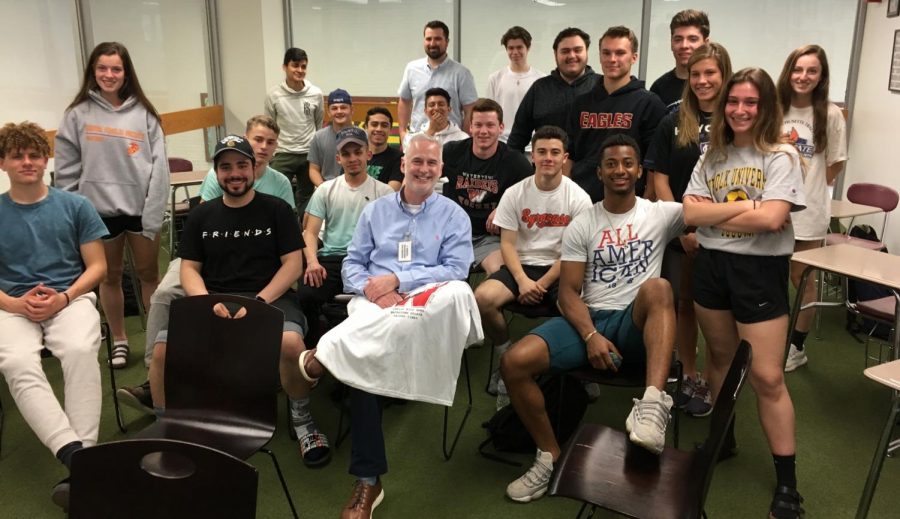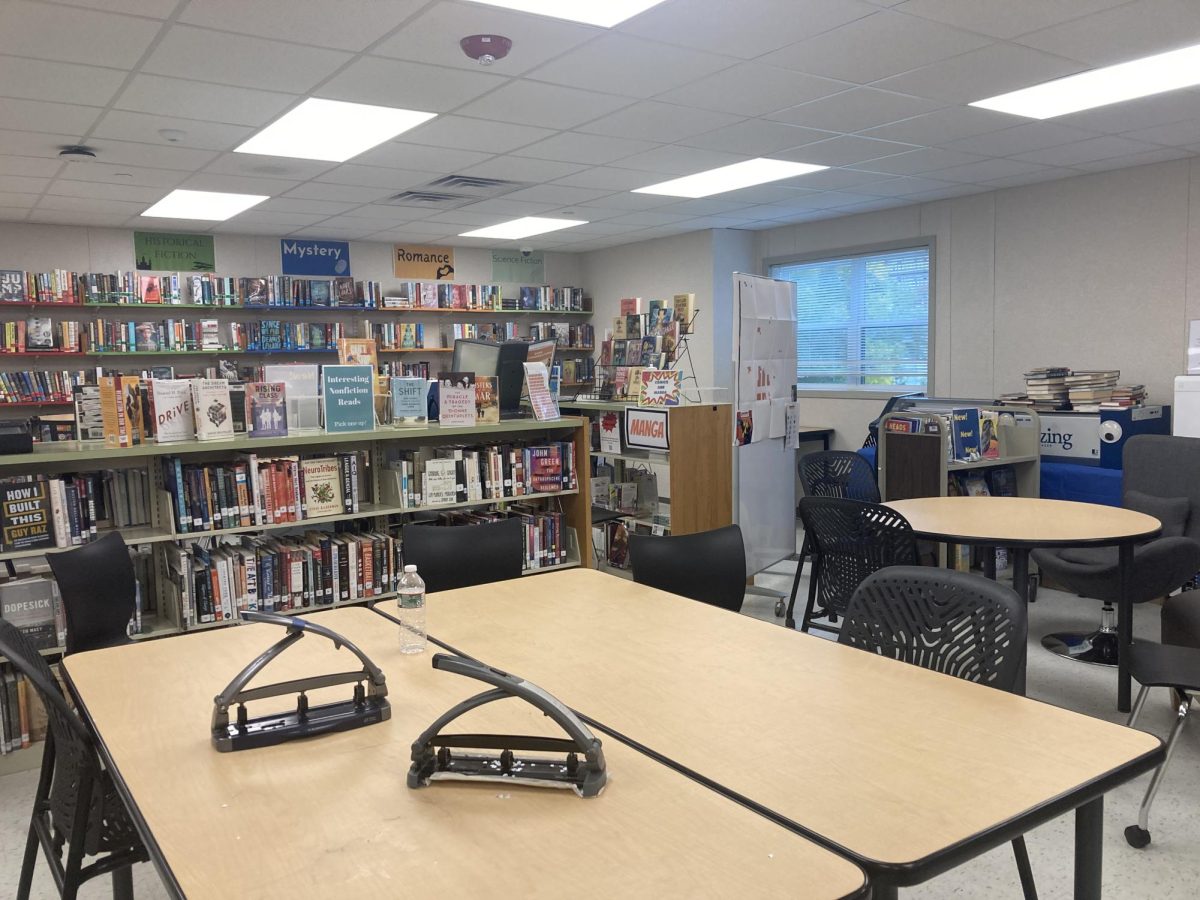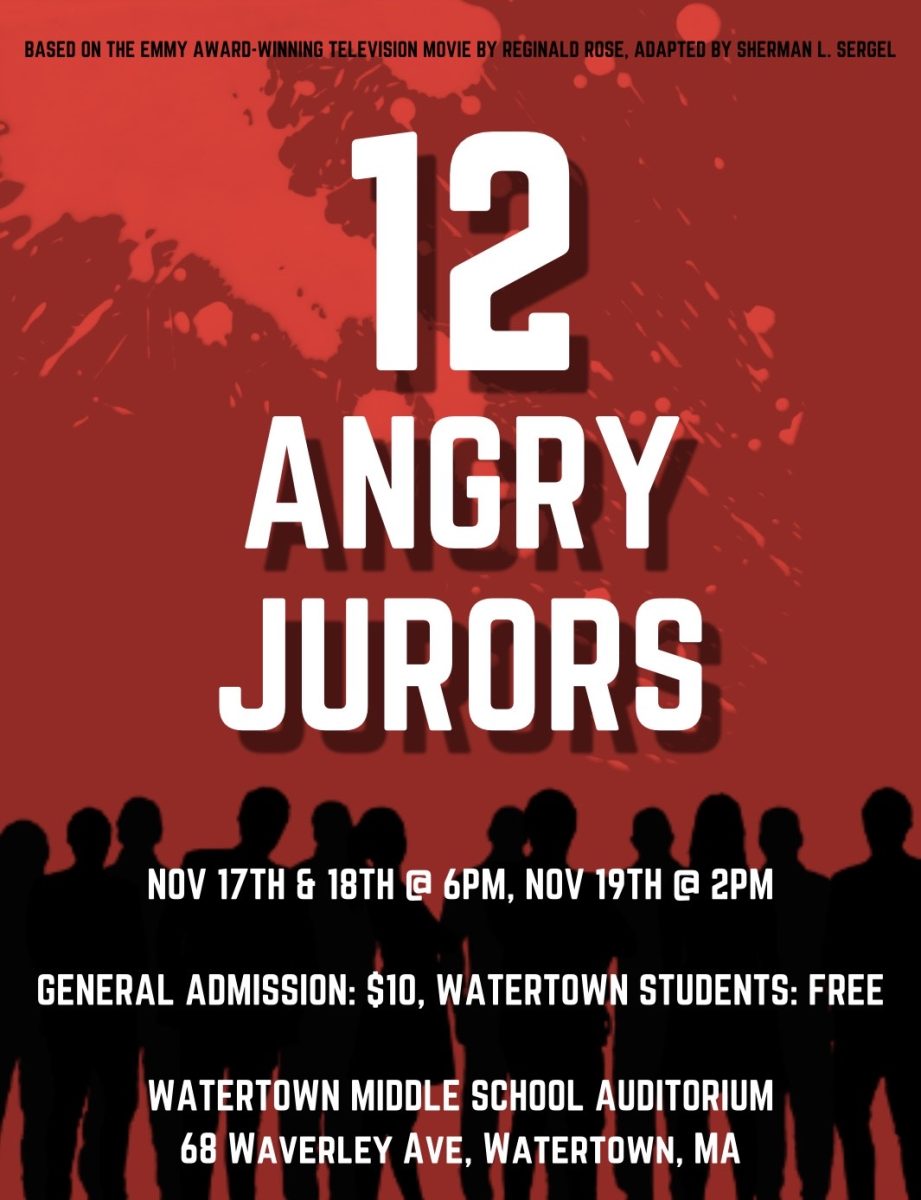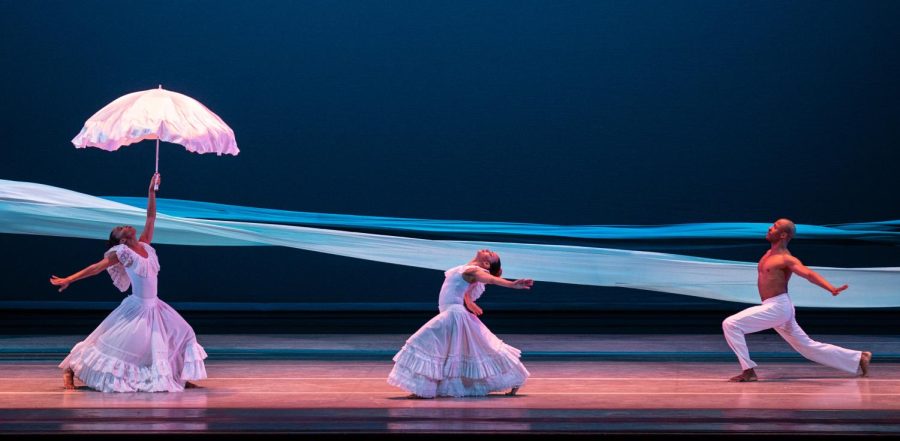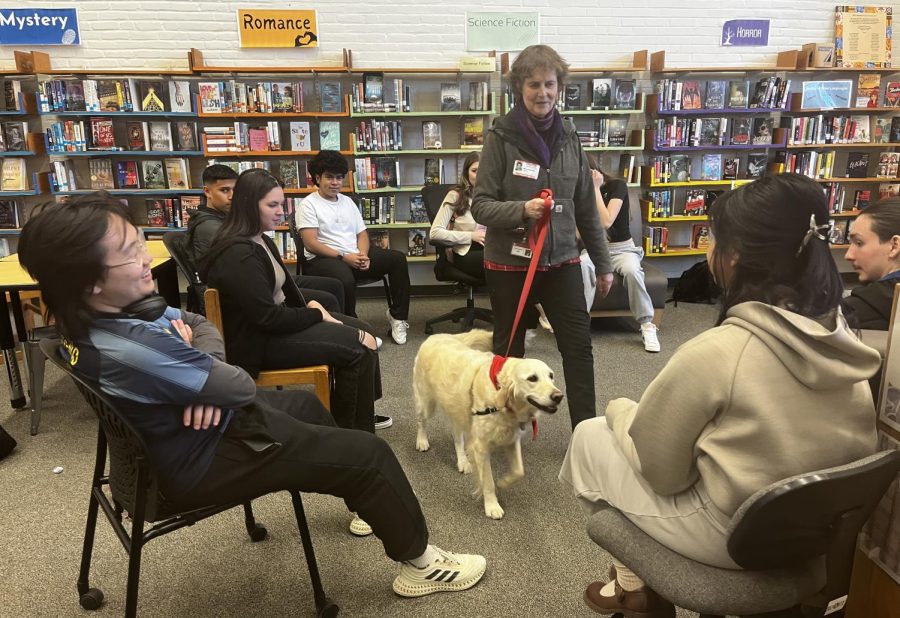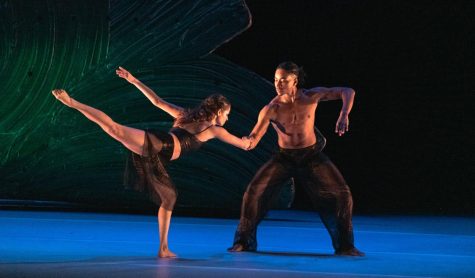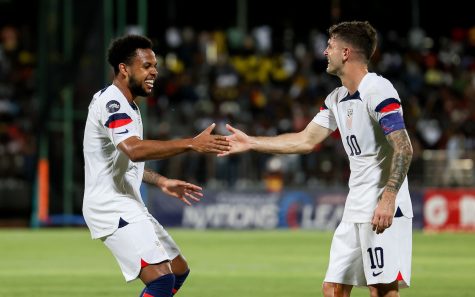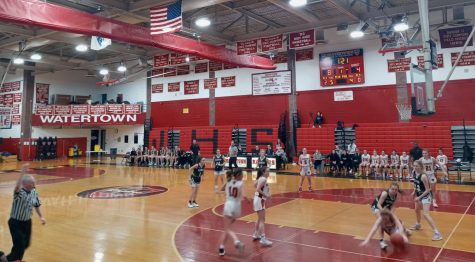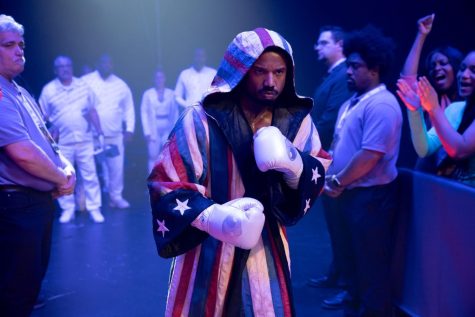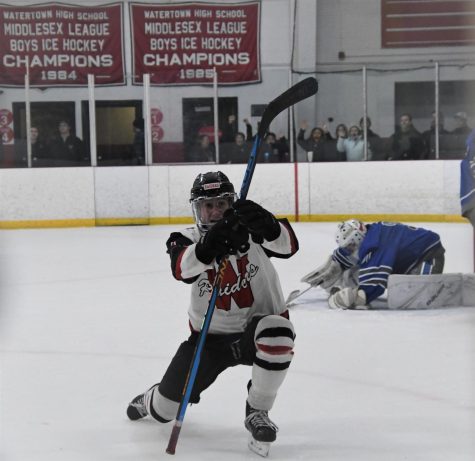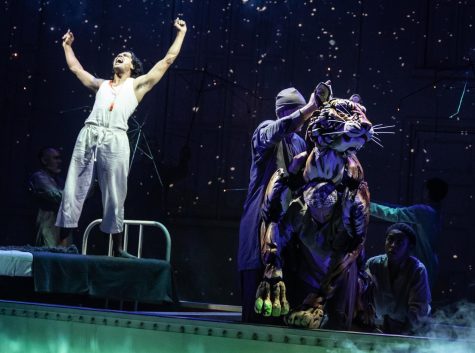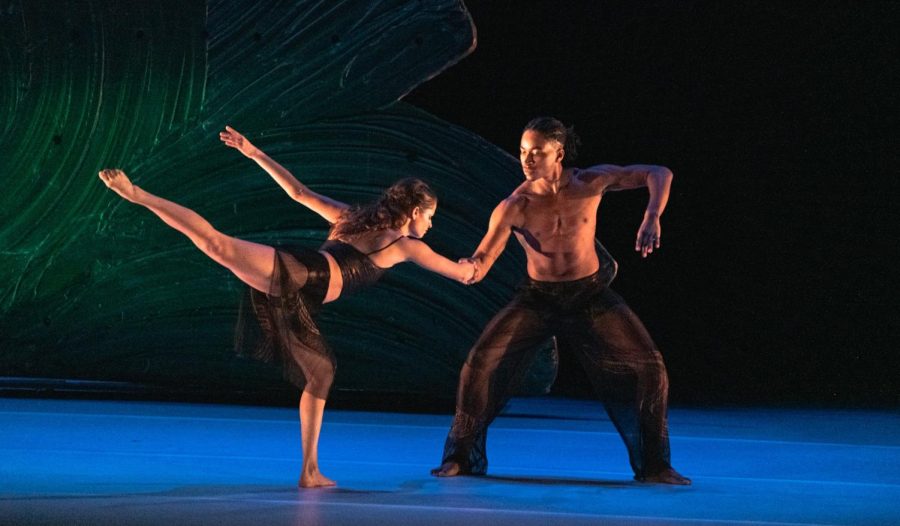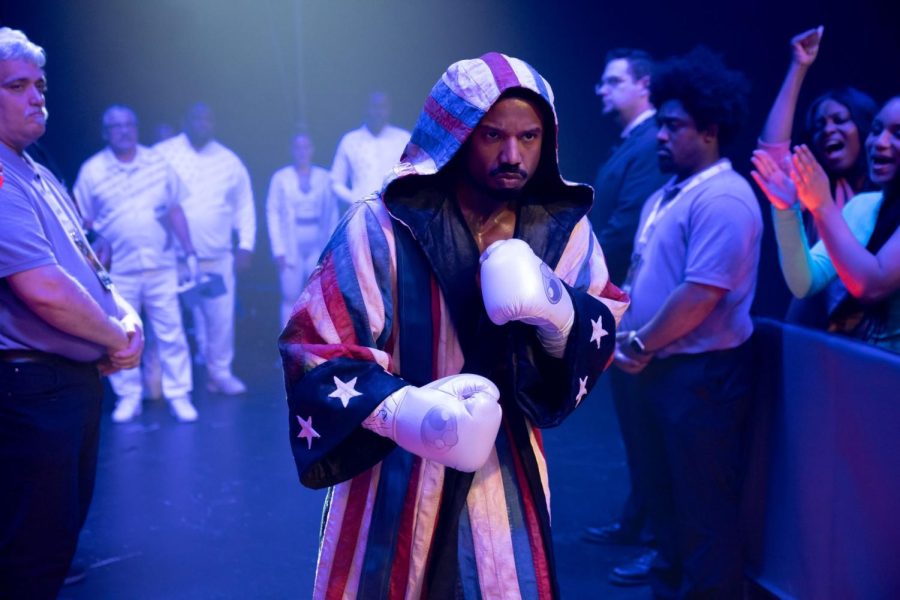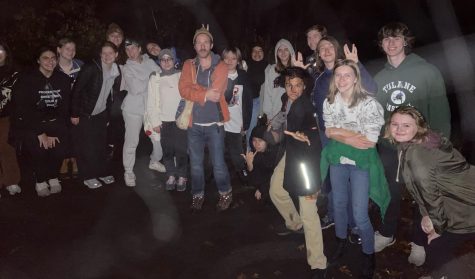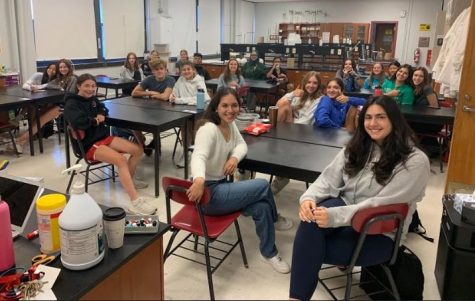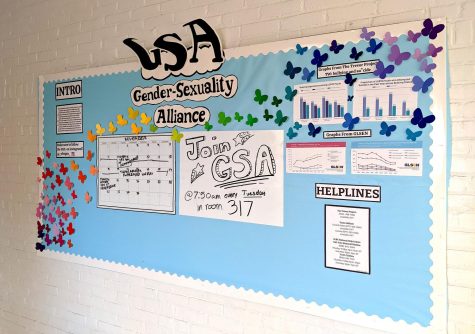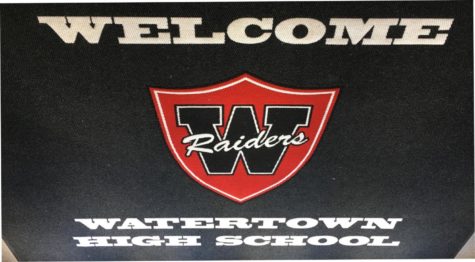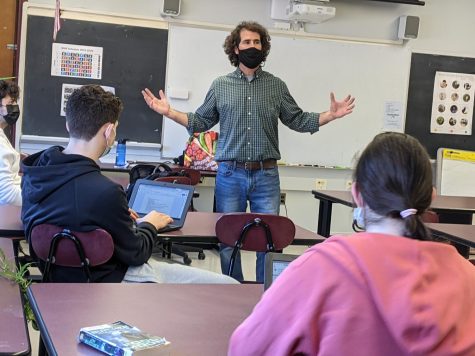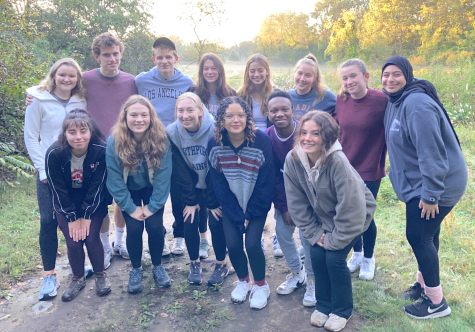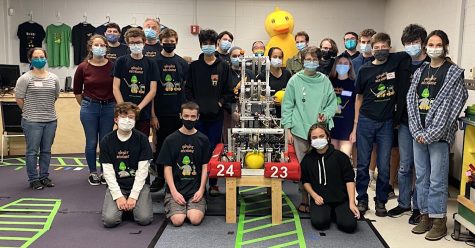Life on the New England Patriots beat with Jim McBride
The Boston Globe sports reporter talks about everything from Bill Belichick to Tom Brady during visit to Watertown High School
Raider Times photo / Raider Times staff
Jim McBride (front row, center), who covers the New England Patriots for the Boston Globe, poses with Graham Madden’s Sports in Literature class at Watertown High School on May 20, 2019.
July 22, 2019
Jim McBride has been covering the New England Patriots for the Boston Globe for the past five years. On May 20, 2019, he took some time to come to Watertown High School and talk with Graham Madden’s Sports in Literature elective class.
Below is a transcript of the interview. (Note: Transcript edited for clarity and space.)
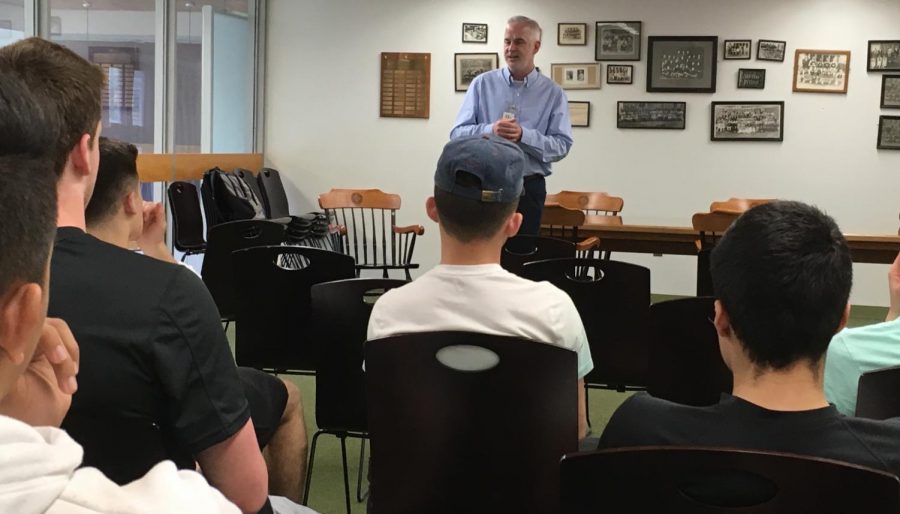
Jim McBride, who covers the New England Patriots for the Boston Globe, talks with Graham Madden’s Sports in Literature class at Watertown High School on May 20, 2019.
WHS: Who’s your favorite player to follow around?
McBRIDE: I’ve been lucky; the Patriots have had a lot of really good guys, but I think one of the most stand-up guys I’ve talked to is Matthew Slater. He doesn’t get on the field a lot; he’s a specialties guy, but he’s incredibly articulate, he’s thoughtful, he always takes time to speak with us. You get a lot of players that don’t really love speaking with the media, but he knows that’s part of his job, so he would be my go-to guy. … Devin McCourty is much the same way. Very smart guy, gets it. A lot of these guys don’t really “get it” as far as the media side; they just want to come in, do their work, keep their head down, and be done with their day, but those guys are really good about that.”
WHS: What would you say would be your worst experience with this job?
McBRIDE: Worst experience with the job is when no one’s around to talk. I used to think this when I was a copy editor, when I was covering the Patriots and whoever would send the story in — let’s say it was on Randy Moss — and I’d read it and I’d say: “OK” and then the [Boston] Herald would come out, a couple of hours later, and their story would be on Randy Moss. “Why are they writing about Randy Moss the same day we’re writing about Randy Moss? Why didn’t we pick someone else or they pick someone else?” and then I realized, when going down there, that some days Randy Moss is the only guy there. So you’re kind of stuck. You write about Randy Moss or you don’t write anything. So that’s kind of a bad scenario, when guys don’t like to talk or don’t show up in the locker room.
There’s media availability to reporters on Monday afternoon. The Patriots usually play Sunday, and the guys are not there. You get in there and you’re ready to write a story, you’ve got to have a Plan A and a Plan B and a Plan C, because they’re only there to watch film from the game before, and we come into the locker room. We get 45 minutes a day to mingle with the players, and they’re all supposed to show their faces by league rules. It doesn’t matter if they walk through the locker room and leave, or stand at their locker for 45 minutes. They’re supposed to be available. They never are. So those days are tough.
[The Patriots players] really kind of take their cue from Tom Brady, who’s pretty good with [the beat reporters]. I think they see that and they say: “Look, if this is the greatest football player in the world, if he can take the time out to talk to these guys, then what’s my excuse?” — JIM McBRIDE
WHS: Can you tell us a little bit about what game day is like at Gillette?
McBRIDE: So I tend to get there about four hours before the game time, just to kind of settle in, avoid traffic, get a vibe in the press box and on the field of who’s there, who might be playing … and then the game starts, and you kind of have your head down for the three hours that the game is there.
I know a lot of people spend a lot of time tweeting. I don’t tweet as much as a lot of reporters because I feel like I’d rather spend my time actually watching the game than commenting on every single play that happens. Once the game ends, we kind of get shuttled down like cattle into the locker room press area. We actually have unlimited time in the locker room after games. Guys, if they win, tend to linger around the locker room and you can get a lot of good stories. If they lose, which they don’t very often, then the locker room’s kind of scarce, but you get that time, and then you get to talk to Coach [Belichick] and the opposing team, and then you go back and you write, and that can take up some three, four hours after the game. So it’s really a long day, game day, but those are really the best, most relaxing days because you know there’s something to write about. You don’t have to worry about, “Oh, who’s gonna be in the locker room today? What’s gonna happen at practice?” You know there’s a game that day, so it’s probably the most relaxing day of the week, from my perspective.
WHS: Have you ever written something and realized later that it was wrong?”
McBRIDE: Too many times. Which is why we have [copy editors] who catch things a lot … I think it happens in every business. You just try to double-check your facts and be right on everything.
WHS: Do players ever try to run away from you?
McBRIDE: Not literally run, but a lot of them will do the quick, “Hey, I’ll catch you in a minute!” and then they leave. Or they’ll be smart and be like: “Tuesday’s a good day for me” and you’re like “OK, thanks!” and then you realize: “Wait a minute, you guys aren’t here on Tuesday.” They do things like that. But none of them are ever rude and, like, scatter away. Because some people will go to the [Patriots’] media relations people and say: “Hey, I tried to get Player X like three days in a row and he ducked me,” and they’ll be like, “OK, we’ll try to get that guy for you.” Media relations guys play a big role in what we’re able to do. They know there’s guys that just don’t like to talk …
The Patriots really do a lot of work on “Hey, what’s this guy like?” Not just “How does he treat his teammates?” or “How does he treat his coaching staff?” Is he respectful of everyone?” And I think that goes into it, and that plays a lot into their thinking, and that’s how they avoid a lot of those locker room dramas. You don’t really hear locker room drama coming out of the Patriots. They really kind of take their cue from Tom Brady, who’s pretty good with us. I think they see that and they say: “Look, if this is the greatest football player in the world, if he can take the time out to talk to these guys, then what’s my excuse?”
WHS: Have you ever tried asking a controversial question that agitated the players?”
McBRIDE: Yeah, it’s happened. It’s tough … Like, I remember when the Patriots signed Michael Floyd and he was fresh off a DUI incident, and it was kind of a delicate thing. I want to approach him and build a relationship with this guy, I don’t want to just be in his face and have the first question be: “How much did you have to drink that night?” So you kind of have to go in and be like, you ask a couple softball questions, kind of get him comfortable, and then you ask: “All right, what happened with this?”
These guys, most of the time — and it was definitely the case with Michael — someone had coached him on it. Someone said, “Look, this is gonna come up. You can’t hide from this… at some point someone’s going to ask you about what happened. Just be as truthful as you can, don’t try to avoid it and say: ‘I’m not talking about that’ because then the next time they get to talk to you, it’s gonna get asked again.” But if it gets asked and answered the first time you see him? Then it’s really done.” Then if it does get brought up the next day, he can say, “Look, I talked about this yesterday.” It can be delicate, because you don’t want to [anger someone] the first time you meet him, because then if he’s gonna be in that locker room for the next five years and you have to deal with him. You don’t want that acrimonious relationship.
You’ll tweet something out innocently, and it will just blow up. And then you’ll tweet a really legitimate piece of breaking news and people don’t even pay attention to it.
— JIM McBRIDE on social media
WHS: How do you balance fostering a good relationship to players with conveying accurate news?
McBRIDE: I think you’ve got to be fair, and you’ve got to make sure that you’re taking everyone’s side into account. With the Robert Kraft [arrest in Florida], I’ve been very lucky where we work at the Globe and they have crime reporters and other reporters to take care of that stuff. We don’t get to talk to Mr. Kraft very often; we see him maybe Super Bowl week, or maybe once during training camp…
The worst thing is to write a story and not get everyone’s side, even if it’s, “Hey, I don’t want to talk to you,” then at least you’ve got that comment on record … It’s usually a columnist’s job to kind of inject their opinion rather than just straight news, where I’m a reporter, I kind of stick to the facts.
I know journalism is kind of moving that way, towards everyone sticking their opinion in every piece. I haven’t really gotten there yet, because I still think that there’s a separation between reporter and columnist. But I think, to strike that balance you have to have everyone’s opinion. If you were going to write a story about what happened with Robert Kraft, you need to have a voice on that side to be completely fair, and that’s what I try to do.
WHS: “How big a deal are concussions in the locker room?”
McBRIDE: I think players are very cognizant of it, especially the Players’ Coalition and guys — the Patriots have a lot of veterans, guys I’ve mentioned before, Slater, McCourty, they’ve been very proactive in talking about concussions and the precautions that the teams take. I think the NFL, as much as they take a lot of abuse for not paying as much attention to player safety as they should, but they really have taken a lot of steps to cut down on injuries …
Whenever one of those [concussion] reports are released, we end up invariably asking a player, and they have their opinions. I don’t think they make them known unless they’re asked, but when they’re asked, they’re pretty thoughtful on it.
WHS: Do you ever ask something and not get the answer you were hoping for? What do you do then?
McBRIDE: Yeah, a lot of times, especially the Patriots organization, they like to play those Jedi mind tricks where you ask a question and they give you a five-minute answer and at the end you’re like: “[makes noises of confusion]”. And it’s funny, sometimes you’ll be listening to the answer, and you think. “Wow, that was a great answer.” and you go back and you transcribe it to put it in your story and you type it up and you’re like: “Wait a minute…” It happens. You just have to try and pick the best pieces out of that answer that kind of fit the answer to your question.
It’s funny, the Patriots have definitely, a lot of them have definitely been coached on how to react to interviews. Like, if I went up to you and said, like say you’re Tom Brady and I went up to you and said: “Tom, how do you think Danny’s doing? He’s a younger guy, how’s he fitting in here?” He’ll invariably talk about every quarterback that’s in the room. He’ll say: “Danny’s a great guy! But so’s Brian. So’s Joe…” and goes right on down the line, and by the end you’re like, “Well I can’t really do that story…” So it’s tough. They make you be creative with your questions, because a lot of times the first one you ask doesn’t get answered, not the way you want it answered, because you never want a frame on your answer, but a lot of times it’s not what you were looking for. You might have a thought and say: “Hey, this is gonna be a good story,” and then you talk to a player…”
I remember sitting at the Atlanta Super Bowl, when they beat the Falcons. People are gonna be writing books about that game — and I got a front-row seat for it. And I got paid to be there. So no complaints from me.
— JIM McBRIDE
WHS: How is covering football different than other sports that you’ve covered?
McBRIDE: It’s probably the most conducive to having a life outside of work. [Covering Major League Baseball is] a daunting task because there’s 162 games, you’re at the stadium from 11 in the morning to, sometimes, 2 o’clock in the morning, when a game gets over. So it’s a long day.
A typical week during the NFL season? You have a game on Sunday, and then on Monday the players come in to watch film of that game, and sometimes late in the season Coach Belichick will give “Victory Monday”, which means guys don’t even have to come in at all. Every Tuesday is off during the season for players. They can come in for rehab or conditioning if they want to, but by NFLPA rules they don’t have to be there on Tuesday. Wednesday’s really the big day for us as journalists to start the week, because we get to speak to Coach Belichick, we get to go to practice, and the opposing coach calls us on conference call and we get to talk to him, and an opposing player will also call and we get a conference call with them. It’s usually the quarterback, so [Wednesday’s] really a big day for us.
Thursday there’s another media availability, and Friday we get to go to practice for a little while, and Saturday they have a walkthrough, but we’re not allowed to go there. It can be a really busy week, but it’s not like you have to be at the stadium for eight hours or nine hours or 10 hours a day like you would for some other sports.
I know, like, in hockey, they have morning skates even on the day of the game. So if you’re covering the game that night you might be at Bruins practice or their morning skate at 10 in the morning, and the game’s not ’til 7. That’s not really the case in the NFL. They don’t have that kind of availability. So it is kind of easier in that way.
WHS: Have you ever written a story about someone and had them get angry at you?
McBRIDE: I’ve never had anyone get angry, per se, but I have had people disagree, and like, a player will pull you aside in the locker room and say: “This was not what I meant.” I usually try to say: “Well, this is the answer that you gave me, and this is what I had to work with, so…”
One thing I was taught very early on when I took this job — from a coach, actually — was to never take anything personally. And I never really have, because you might think that you have a really good relationship with a player, but he could’ve had a bad day, he could’ve been crushed by his coach for two hours out there, and then he walks into the locker room and there’s my smiling face ready to ask him questions when the last thing he wants to do is answer questions. So you take that with a grain of salt.
You might think you have a great relationship with a player, you say hi to him every day when you see him in the locker room, and then one day you go to ask him a question and he’s like: “Who are you?” You just can’t take it personally.
WHS: Did you get a chance to talk to anyone from the draft this year?
McBRIDE: So the night of the draft is, once they draft a guy, we all stay down in Foxborough, and they’ll bring us in a room and that guy’ll come on a conference call for five or 10 minutes, and it’s probably the most open they are for their entire careers. They’re dying to talk to you, they’re dying to tell you how excited they are, then they kind of get sucked into the whole NFL thing where a guy thinks, “Oh I don’t wanna give out too much information.” We even had a guy, Chase Winovich, who was the third-round draft pick and we asked him a couple questions and he just kind of paused and he said, “I’m not sure if I’m supposed to talk right now,” so clearly someone told them, “Keep it short and sweet.”
WHS: What’s the biggest misconception about Belichick?
McBRIDE: How popular he is with the other coaches and scouts. I think a lot of times, because of the persona he gives off in press conferences or any kind of dealings with the media, he comes off as a standoffish guy, a guy that’s curt and rude, but he’s far from that. I get to see him almost on a daily basis during the season, and you guys might get to see those 10- or 15-second clips of him on news or on ESPN where he’s giving a really short answer, but what they rarely play is the thoughtful answer he gives to a legitimate football question. He knows, when you’ve done your research and you come up with a question that is football-related — not injury-related or off-field stuff — if you come up with a really good football question? It’s like listening to a historian. He will give you a great answer. He’ll give you examples of what you’re looking for, he’ll talk about players from the ’40s and ’50s that you’ll have to turn around and look up and you’ll be like, “Wow, this guy was exactly like the guy I asked about,” so he’s very open when it comes to football topics.
WHS: What are some of the biggest benefits? Like, do you get tickets, or…?
McBRIDE: No tickets; that would be a conflict of interest. The biggest advantage for me was being able to travel the country and see all the stadiums and meet all these people, and actually be at these games that are historic. I remember sitting at the Atlanta Super Bowl, when they beat the Falcons. People are gonna be writing books about that game — and I got a front-row seat for it. And I got paid to be there. So no complaints from me.
They like to play those Jedi mind tricks … A lot of [the Patriots] have definitely been coached on how to react to interviews.
— JIM McBRIDE on getting good quotes in an interview
WHS: What’s Super Bowl week like?
McBRIDE: It’s crazy. It starts on the previous Sunday when the team flies in, and you’ve gotta have someone there to cover the team getting there and there’s a press conference then. There’s press availability all week, there’s no off days. There’s people pulling you from all directions. I’ll get PR calls from, like, Old Spice: “We’re coming out with a new body wash this week for the Super Bowl. Can you come and do a story on it?” There’s celebrities in town. There’s chances to talk to, like, older players, like the Hall of Fame guys… The only non-crazy time for us is the actual game. When the kickoff goes, you’re like, “Finally,” and you can actually watch football.
WHS: Since you’re allowed to watch practices, do opposing teams’ scouts try to sneak in?
McBRIDE: No. The best part about training camp is we get to watch the entire practice from start to finish for the first two weeks. And then when the regular season starts we only get like a 10- to 15-minute window. Basically the first five to seven minutes you’re taking attendance, because you want to make sure everyone’s there. And some days they don’t wear jerseys. Security’s tight. They hold us in kind of a holding cell, for lack of a better word, before they let us into practice. You could not sneak into a Patriots practice. There’s actually a hotel in Patriot Place, and the top floor used to overlook the practice field behind Gillette, and rumor has it — I’ve never been able to confirm this — that teams would rent that top floor so they could overlook it, and Coach Belichick caught wind of it and had something else built to take the view away from that hotel so that you can’t see the practice fields because he was so worried that there might’ve been some sabotage or espionage going on.
WHS: How has the job changed with social media?
McBRIDE: It’s so funny. You’ll tweet something out innocently, and it will just blow up. And then you’ll tweet a really legitimate piece of breaking news and people don’t even pay attention to it. So it’s whatever catches people’s attention at the time. There used to be a time when you could have an interview with a guy, even if it was a group interview, and you’d go back and come up with a decent story. But now, when there’s a group interview, someone has already taken the best quote from that story and tweeted it out. The news cycle went from 24 hours to 24 seconds because of Twitter.”
WHS: So what’s Tom like? And what’s Gisele like?
McBRIDE: Haven’t met Gisele. Seen her at many practices and in the locker room after games and such. Tom is a genuinely down-to-earth good guy who has come to the realization that his time is extremely valuable. He talks once a week on Thursdays, once in a while they push it back to Fridays, but he’s not one of those guys you can consistently approach at the locker and say, “Hey Tom, you got five?” because he’s just never there. He’s either getting a massage or he’s getting some kind of treatment or he’s in the film room working on something or he’s doing an interview for whichever network is covering the game that week. So if you can catch him during training camp coming off the field you once in a while get a one-on-one.
I’ve been doing it for going on five years and I think I’ve had three one-on-ones with him in five years, so it’s just not that easy to pin him down. But when you do he’s very good. I think he knows when you talk to him one-on-one you want something that no one else has and he usually gives it to you. He gets that. To get even 30 seconds with him, makes your day as a journalist.
–July 22, 2019–
